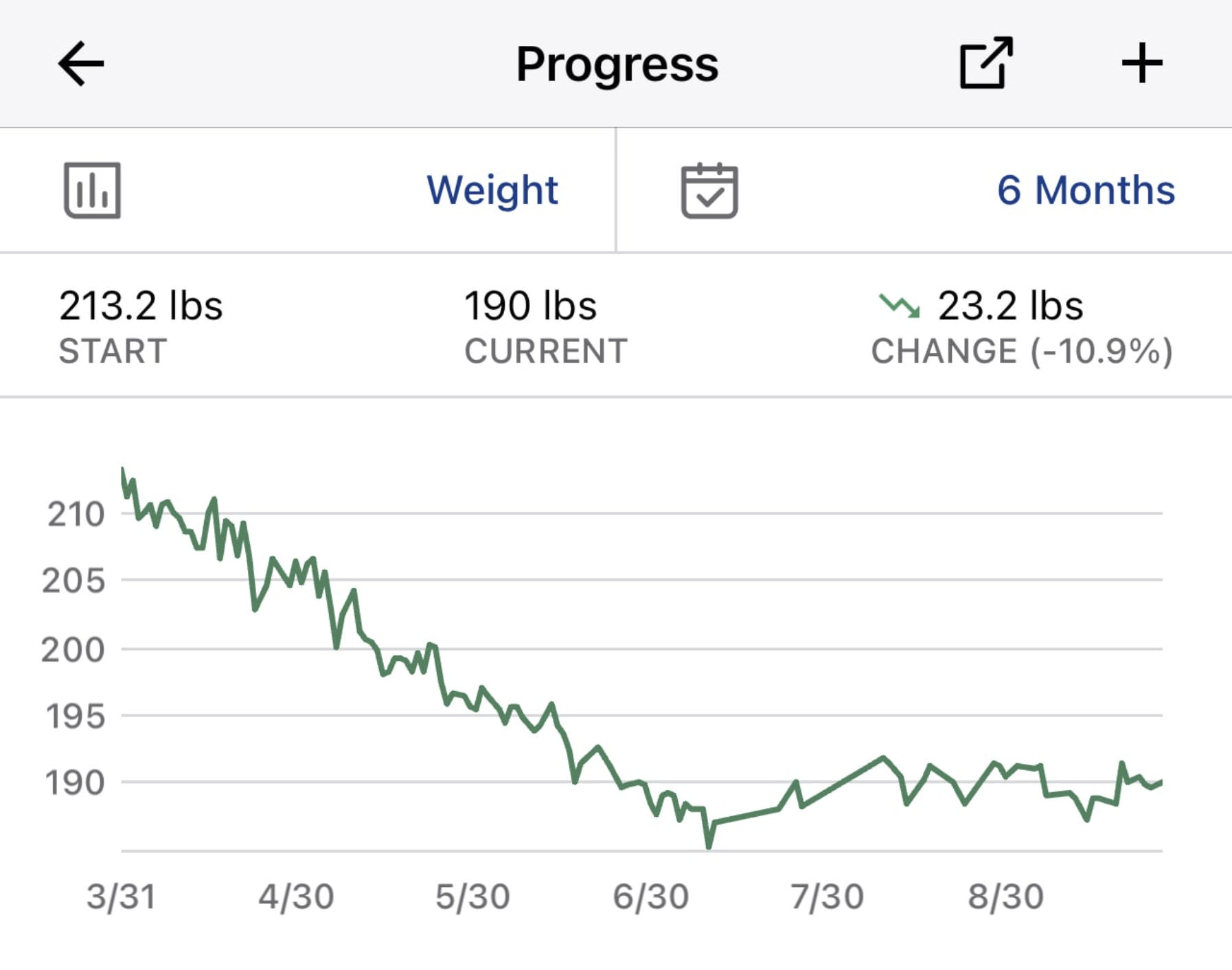Mastering Body Composition
@bephrem
June 2022
(over 3 years ago)
At the beginning of 2022 I took a half-year sabbatical to focus on personal health and fitness (as well as other areas of life). I had a singular focus of reaching <10% bodyfat and getting in the best shape of my life. I would lose ~30lbs in the process, the following are my learnings.
Summary
The below encapsulates, as succinctly as possible, the only principles needed to alter your body composition to achieve your aesthetic goals (with additional tips & observations).
Note: The focus is on body composition which is a single aspect of overall health. In-depth nutrient balance, cardiovascular endurance, etc are not directly addressed.
Gaining Muscle Mass
Microtears: Workout to create microtears in your muscles, this is done by lifting with high intensity (~4-8 reps is fine) to failure, always pushing the weight from last workout.
- Challenge: You can make quick adjustments if you can't do a challenge weight (stop mid
set and grab new weight then keep going), but you must always challenge and stress the muscles (with
good form so you get proper isolation)
- You must bring an intensity to the table that is ready to take on weights you don’t think you can handle.
- Never compromise form. You will risk injury and isolate your target muscle group less effectively.
- Isolation: Isolation is key. What you isolate will grow.
- Mind muscle connection is critical to establish in all of your exercises. You have to really feel the stretch & contraction, & in the right location, for the movement to be effective.
- Don't Go To X Reps: Following a program and hitting X reps is just a guiderail. You want to pick heavy
weight that you can go to 4-8 reps on, and do that weight to failure (transcend a rep-count). If you get to
9+ reps, go heavier. If you can do just 3-4 reps, go lighter.
- Exercises are a detail, routine is a detail. Find movements that you like, that isolate the proper muscle group(s). Then focus on progressive overload (aggressive weight progression).
Protein: Get 1g of protein per 1lb of overall weight daily. Eat at or a few hundred calories above maintenance calories. The main concern around calories is having the energy to do your workouts with vigor to create microtears in the muscle and maintain existing muscle mass.
Sleep: Sleep well. This is important because your muscles are repaired the most when you are in deep sleep. You will notice soreness recover greatly after a night's sleep.
The Goal
You are succeeding if your strength increases every 1-2 workouts by ~5lbs in weight or 2-4 more reps on an exercise at X weight (when you go from 4 reps @ 80lbs to 7-8 reps @ 80lbs, then you hop to 4 reps @ 85lbs next workout, etc). You will notice your muscles will be larger as your body adds muscle tissue.
Tips
- Lifting twice a day for different body regions can speed up your mass & strength gains. It will take a toll on your joints & tendons the most (vs muscles, which will recover quickly if you are sleeping & eating right). It will also lead to overtraining and chronic fatigue if you do not eat enough calories.
- If you have worked out for years and haven’t made meaningful strength or lean mass gains, it is likely due to diet (protein intake + energy balance) or a non-aggressive weight progression.
- You will be surprised at the amount of lean mass you really have when you cut. It is critical to reach a good point of size before you move to a caloric deficit where gaining lean mass becomes much more difficult to unlikely, otherwise you will be “shredded but small”.
- Chicken is a very effective way to fulfill your protein macro (any lean meats).
Cutting Fat
You will notice as you gain muscle mass, you will add fat as well. Eventually it will come time to work on cutting down your fat stores. This is a judgement call by you based on your overall goals (it is recommended to begin cutting when you are ~15%+ bodyfat, then bulk when you get down to 10-12%, then repeat or maintain).

Your weight loss will look something like this. Notice how on the order of any rolling 1-week window it would seem like nothing is happpening. The above shows a period of weight loss followed by maintenance.
Calorie Deficit + Protein: Use an app like MyFitnessPal to maintain a calorie deficit. It is best to do a deficit that you can manage given your lifestyle. 1lb a week is a good loss rate, if you do 2lbs you risk muscle loss more, but if you hit your protein macro consistently and workout hard as above, you should be fine (but it is riskier if you slip, your body will literally "eat" your muscle). You will want to continue to get 1g of protein per 1lb of overall weight.
Continue Lifting: Continue lifting with intensity and push yourself. You will notice your lifts plateau, it is very difficult to gain muscle and strength in a calorie deficit, you are just fighting to maintain ground, maintain muscle mass as your body ticks away at fat stores day by day.
Sleep.
The Goal
You are succeeding if your strength stays the same week after week & your calorie deficit is maintained. Your weight will drop gradually, and it will be fat stores being consumed, less so muscle (though muscle loss is unavoidable in a cut).
Tips
- Subcutaneous fat adds much more padding to our frame than we realize. There is a mental “trough” you will go through near the end of your cut where you appear smaller (but look better) even having maintained all lean mass & strength. This is normal. You have to continue to your target bf %, the most dramatic visual changes happen from ~12% → <10% (roughly). The final “sheath” of fat hiding sharp muscle definition & vascularity remains. This is the hardest time to push through psychologically as you will be smaller & not at your target aesthetic. It will seem far, but it is a sign you are close.
- Cutting any more than 1000 calories daily under your BMR (losing 2lbs a week) is very taxing. You can do it, and maintain muscle w/ high protein intake, but your cognitive ability and general ability to feel overall health & wellbeing will be hindered. It sucks & will leave you feeling sick.
- You want to be gradual in how you decrease calorie intake to see how your body responds in catabolizing fat. If you drop your calorie intake too fast your body will react by flooring your metabolism (in a process called "adaptive thermogenesis") as a starvation response. This will lead to lower energy expenditure (a lower BMR than you anticipate) and less "opportunity" for fat to be catabolized. It is a balancing act to push the deficit & back off when you are "over-milking" on fat loss at a certain energy deficit.
- While cutting, body composition scans can be a great tool to see what lean muscle mass you are keeping & how much in fat stores you are shedding. The perfect cut is shedding fat stores and losing very little lean muscle mass (& strength ideally not going down).
- You can do daily weigh-ins, but only take your 2-week weight trend seriously. Day-to-day you will fluctuate in water weight. Do not get discouraged. If the trend is there, it is happening. Doubt will be your biggest enemy in staying consistent. If the 2-week is flat, you need to eat less & move more, adjust.
- During a cut you can get a good inventory of your muscles. Use that time to determine focuses for your next muscle-building phase. (e.g. need to even out legs with upper-body, need more mass in shoulders, more definition in lower pec, etc).
- Where fat comes off first will be different for everyone. Most likely, you will notice most coming off of your back first (and you will think nothing is happening as your weight comes down). Lower abdomen fat tends to stay stubbornly until very low bodyfat %. As your bodyfat % comes down you will see focused fat loss in certain areas, as well as “even” fat loss across a broad range of areas.
- Slow cardio is your best friend during a cut. Things like walking are easy ways to burn an extra 100-300 calories to drive your deficit or recover from cheat meals.
- Fruit are your best friend. They offer a low calorie way to fill your stomach to subside hunger (watermelon especially).
- Only eating after 12pm can be a good way to manage hunger (if it fits your lifestyle). Hunger does not directly map to you needing food. If you can manage the hunger, you can save on the day’s calories.
- As your weight goes down, so will your maintenance calorie amount. This will lead to slower weight loss unless you adjust. Look at the 2-4 week trend and make the judgement call on eating less/moving more. It is a constant process of watching and adjusting.
- As your bodyfat % nears <10% your body will start catabolizing a greater proportion of muscle over fat (though it will still mostly be fat being catabolized to make up for your negative energy balance). It becomes a much harder fight as you will be low on energy as well (from your calorie deficit). You have to keep pushing through (if you are going sub-10%). This is why it is hard to naturally sustain sub-10% bodyfat, your body is fighting for a steady-state of healthy fat stores.
- As your mental index of foods' macronutrient composition grows, you will realize that the most tasty, craved-after, foods are the most calorie dense & nutrient poor. When you become more conscious of this biological wiring, you have more power to fight cravings, and eventually they disappear when you realize what these foods cost you over time in energy surplus (but having occasional days where you treat yourself is fine).
Then...
Repeat the above with consistency. It is just a matter of time. Eating, sleeping, & your body doing the work.
Other General Tips
- It will take you about 2x as long as you think it will take to reach your target physique and much more effort than you can imagine. You have to push through emotional lows when the results are just not showing, they will come. Consistency and time is all you need. Being consistent is hard and boring.
- You can lose fat and add muscle mass/strength, especially when you are starting out (if you eat at maintenance and lift hard bringing you into a distinct energy deficit). The gains in strength come fast initially, you don't have to see these phases as separate, just take away their properties & characteristics.
- Steroids or any enhancing substances are not necessary. A solid foundation of training hard and eating correctly is all you need to completely transform your body in 6 months - 2 years. Most outstanding physiques you see online (like Instagram, etc) claiming to be natural are often not, so do not compare your progress to anyone but yourself and where your genetics can take you.


After photos, July 2022.